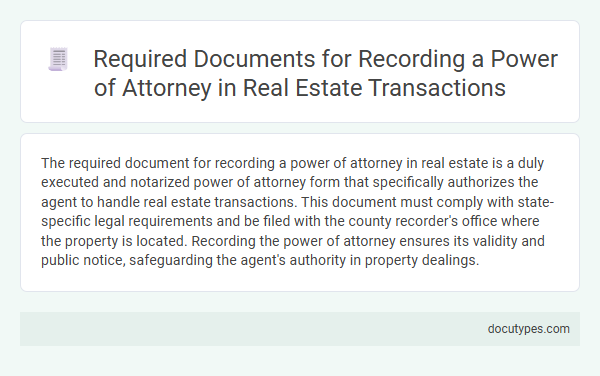The required document for recording a power of attorney in real estate is a duly executed and notarized power of attorney form that specifically authorizes the agent to handle real estate transactions. This document must comply with state-specific legal requirements and be filed with the county recorder's office where the property is located. Recording the power of attorney ensures its validity and public notice, safeguarding the agent's authority in property dealings.
Introduction to Power of Attorney in Real Estate
A Power of Attorney in real estate is a legal document that authorizes one person to act on behalf of another in property transactions. This document is essential for managing property sales, purchases, or other real estate decisions when the principal cannot be present. Proper recording of the Power of Attorney ensures its validity and protects all parties involved in the transaction.
Importance of Recording a Power of Attorney
Recording a Power of Attorney in real estate requires specific documentation, primarily the original or a certified copy of the Power of Attorney document. This document must be notarized and often accompanied by an affidavit of authority to confirm the agent's legal right to act on behalf of the principal.
Proper recording of a Power of Attorney is crucial to ensure that all real estate transactions are legally recognized and protected from disputes. You safeguard your property interests by formally documenting the agent's authority with the county recorder's office, preventing unauthorized actions and enhancing the security of your real estate dealings.
General Requirements for Document Submission
Recording a Power of Attorney in real estate requires specific documents to ensure legal recognition and enforceability. The general requirements typically include the original or a certified copy of the Power of Attorney document, properly notarized to confirm authenticity.
You must also submit a completed recording form provided by the local county recorder's office, along with the applicable recording fees. Some jurisdictions may require additional attachments such as an affidavit of witness or legal descriptions of the property involved. It is important to verify local guidelines to avoid delays in processing your submission.
Original Power of Attorney Document
Recording a power of attorney in real estate transactions requires submitting the original power of attorney document. The original document ensures authenticity and legal validity during the property transfer process.
- Original Document Requirement - The recording office mandates the original power of attorney to verify its legitimacy and prevent fraud.
- Notarization and Signatures - The original document must be properly notarized and signed by the principal to be accepted for recording.
- Retention and Records - After recording, the original power of attorney is retained by the county or relevant authority as part of the public property records.
Notarization and Authentication Requirements
Recording a Power of Attorney in real estate requires specific documentation to ensure its validity and acceptance by the county recorder's office. Understanding notarization and authentication requirements is crucial for a smooth recording process.
- Notarization is mandatory - The Power of Attorney document must be signed in front of a licensed notary public to confirm the identity of the signer.
- Authentication may be required - Some jurisdictions demand additional authentication, such as an apostille or certificate of acknowledgment, especially for documents executed out of state.
- County-specific forms apply - Certain counties may require a specific cover sheet or affidavit accompanying the notarized Power of Attorney for recording purposes.
You should consult local recording office guidelines to ensure compliance with all notarization and authentication standards before submission.
Identification Documents of Principal and Agent
Recording a Power of Attorney in real estate requires specific identification documents for both the principal and the agent. The principal must provide a valid government-issued ID, such as a driver's license or passport, to verify their identity. The agent also needs to present similar identification to ensure the authenticity of the authorization and to prevent fraud in property transactions.
Property Ownership Documentation
Recording a Power of Attorney (POA) in real estate requires specific property ownership documentation to ensure legal authority and ownership verification. Proper documentation prevents disputes and confirms the agent's ability to act on behalf of the property owner.
- Deed of the Property - The official deed proves ownership and must be submitted to link the POA to the correct property.
- Prior Recorded Documents - Existing recorded documents related to the property help verify the chain of ownership and legal status.
- Identification of the Grantor - Valid identification documents confirm the identity of the person granting the power of attorney.
Supporting Legal Forms and Affidavits
What is the required document for recording a power of attorney in real estate? Recording a power of attorney in real estate typically requires the original power of attorney document, properly executed and notarized. Supporting legal forms such as affidavits of authority or acknowledgment may also be necessary to verify the authenticity and scope of the power granted.
Fees and Payment Proof for Recording
| Required Document for Recording Power of Attorney in Real Estate | Original Power of Attorney document, duly notarized and signed by the principal. |
|---|---|
| Fees for Recording | Recording fees vary by county but commonly range from $25 to $150. Some jurisdictions charge a flat fee, while others depend on property value. |
| Payment Methods | Accepted payments typically include cash, check, money order, or electronic payments depending on the county recorder's office. |
| Proof of Payment Required | Receipt or stamped acknowledgement from the county recorder's office verifying payment of recording fees. |
| Additional Documentation | Valid identification of the person submitting the document may be required to verify identity and authorization. |
| Important Notes | Failure to provide correct proof of payment or required fees can delay the recording process. Verify local county requirements before submission. |
What Is the Required Document for Recording a Power of Attorney in Real Estate? Infographic

